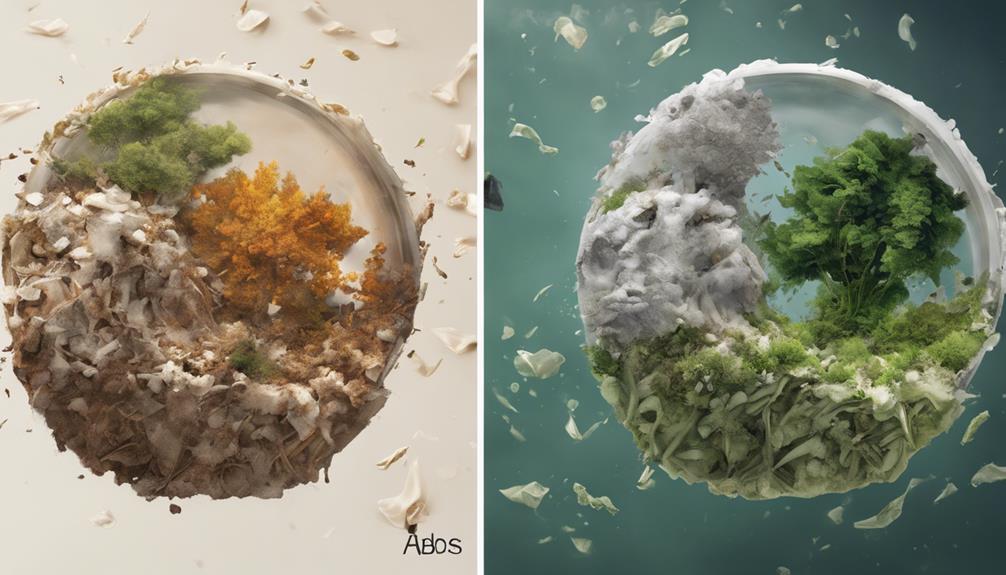Did you know that ABS plastic production consumes approximately 5-8% of the world's oil supply? While ABS is widely used for its strength and impact resistance, questions arise about its true eco-friendliness. The debate around ABS plastic's environmental impact is multifaceted, considering aspects like recycling challenges, biodegradability concerns, and the overall lifecycle of the material. As you explore the complexities of ABS plastic's sustainability, you may uncover surprising insights that shape your perspective on its ecological footprint and alternatives worth considering.
Environmental Impact of ABS Production

When contemplating the environmental impact of ABS production, it's essential to understand the processes involved in creating this petroleum-based polymer plastic. ABS, derived from acrylonitrile, butadiene, and styrene, is manufactured through emulsion or continuous mass polymerization methods.
The production of ABS involves the utilization of non-renewable petroleum resources and the emission of greenhouse gases. Moreover, the disposal of waste by-products from ABS production can contribute to environmental pollution. Considering these factors, it becomes evident that the production of ABS has a notable carbon footprint.
As a conscious consumer, being aware of these environmental implications can guide your choices towards more sustainable alternatives and promote a greener future.
Recycling Challenges and Solutions
Dealing with the recycling challenges of ABS plastic necessitates innovative solutions to enhance sustainability practices.
- Implementing advanced sorting technologies can improve the separation of ABS from other plastics, increasing recycling efficiency.
- Collaborating with manufacturers to design products with easier disassembly and recyclability in mind can help reduce waste and promote a circular economy.
- Educating consumers about the importance of properly disposing of ABS products and the benefits of recycling can foster a more environmentally conscious society.
Biodegradability Concerns With ABS

To address concerns about the biodegradability of ABS plastic, understanding its recycling capabilities is essential. ABS isn't biodegradable but is recyclable due to its thermoplastic nature. The molecular linkages in ABS break down with heat cycles, necessitating the addition of pure ABS to recycled material for durability.
Unfortunately, most ABS ends up in landfills due to recycling limitations, as biodegradable plastics take a long time to decompose. While recycling ABS helps reduce pollution and energy consumption, its inability to biodegrade raises environmental concerns.
Proper disposal methods and increasing recycling efforts can mitigate the impact of non-biodegradable ABS waste on the environment. Consider exploring alternative materials with better biodegradability for a more eco-friendly approach.
Health and Safety Considerations
Considering the potential health risks associated with ABS plastic, understanding safety measures is of utmost importance. When working with ABS, prioritizing your well-being is vital. Here are some key safety considerations to keep in mind:
- Always wear a mask or work in a well-ventilated area to avoid inhaling toxic fumes.
- Use proper protective gear like gloves and goggles to prevent skin contact and eye irritation.
- Dispose of ABS waste responsibly to minimize environmental impact and potential health hazards.
Sustainable Alternatives to ABS

When seeking sustainable alternatives to ABS plastic, exploring biodegradable and compostable materials can contribute to environmentally friendly practices. Bioplastics like PLA (polylactic acid) and PHA (polyhydroxyalkanoates) are derived from renewable resources such as corn starch or sugarcane. These materials degrade naturally, reducing environmental impact compared to ABS.
PLA, for example, is compostable in industrial facilities and breaks down into non-toxic components. PHA is another bioplastic that offers similar properties to conventional plastics but is biodegradable. By opting for biodegradable alternatives to ABS, you can support the shift towards more sustainable materials that minimize pollution and promote a circular economy.
Make a conscious choice to use bioplastics for a greener future.
Frequently Asked Questions
Can ABS Plastic Be Composted at Home?
ABS plastic cannot be composted at home. It is not biodegradable but can be recycled. Consider checking if your municipality offers recycling programs for ABS. Recycling helps reduce pollution and energy consumption.
Are There Any Health Risks Associated With Using ABS Products?
Are there any health risks associated with using ABS products? ABS, though non-toxic in its final form, can emit harmful fumes when melted. Be cautious during processes like 3D printing. Consider alternatives such as PLA or nylon for safer use.
What Are the Eco-Friendly Disposal Options for ABS Waste?
When disposing of ABS waste, consider local recycling programs. Some areas accept ABS for recycling, reducing pollution and energy use. Check for pickup services or drop-off locations. Recycling ABS helps the environment by giving it new life.
Are There Any Biodegradable Alternatives to ABS Plastic?
When seeking biodegradable alternatives to ABS plastic, explore options like PLA or PHA. These bio-based materials offer eco-friendly choices for various applications. Remember, going green is not just a trend; it's a commitment to a sustainable future.
How Does ABS Recycling Contribute to Reducing Carbon Emissions?
Recycling ABS helps decrease carbon emissions by reusing this versatile plastic in various products. Municipal pickup programs may accept ABS. Breaking down and reprocessing ABS with pure material enhances durability, making it an eco-friendly option.
Conclusion
You've now learned that ABS plastic isn't exactly Mother Earth's best friend.
But fear not, with a little bit of recycling, education, and innovation, we can turn this plastic predicament into a green opportunity.
So next time you see that ABS plastic product, remember to recycle, spread the word, and maybe even opt for a more eco-friendly alternative. Mother Nature will thank you!